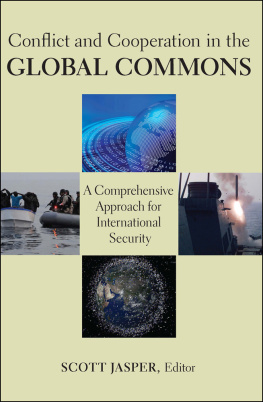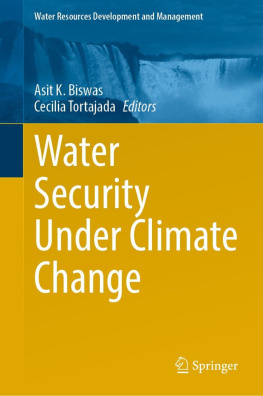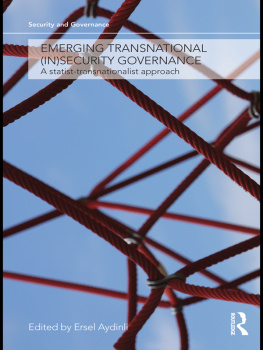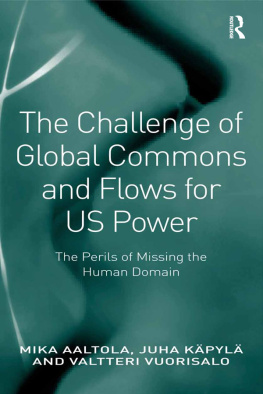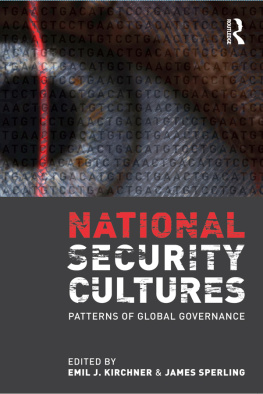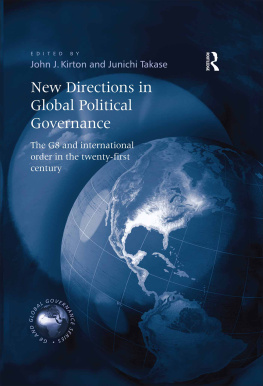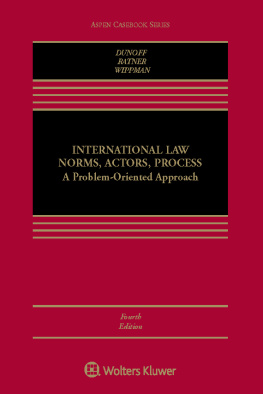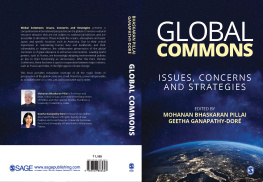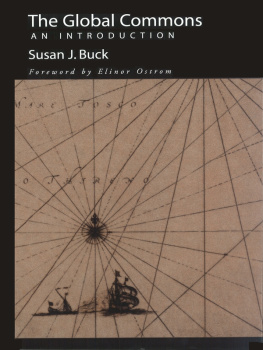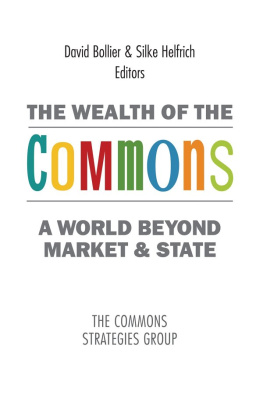2012 Georgetown University Press. All rights reserved. No part of this book may be reproduced or utilized in any form or by any means, electronic or mechanical, including photocopying and recording, or by any information storage and retrieval system, without permission in writing from the publisher.
Library of Congress Cataloging-in-Publication Data
Conflict and cooperation in the global commons : a comprehensive approach for international security / Scott Jasper, editor.
p. cm.
Includes bibliographical references and index.
ISBN 978-1-58901-922-5 (pbk. : alk. paper)
1. Security, International. 2. Global commons. 3. International cooperation. 4. National securityUnited States. I. Jasper, Scott.
JZ6005.C66 2012 355.0335dc23
2011051795
This book is printed on acid-free paper meeting the requirements of the American National Standard for Permanence in Paper for Printed Library Materials.
15 14 13 12 9 8 7 6 5 4 3 2 First printing
Foreword
Contested Superiority in the Commons
The United States has a long-standing interest in protecting access to the global commons. Since the founding of the Republic, the US military has safeguarded American lives and trade abroad. Military power not only has provided security and prosperity for the nation, it also has protected international airspace and the high seas to guarantee the free flow of ideas, commerce, and travel around the world. The global community must have unimpeded access to space and cyberspace together with the air and maritime domains. The ability to protect the commons is paramount to the progress, well-being, and stability of the entire international community.
Today the United States and its allies and partners face the most complex and challenging security environment in recent memory. First, an international coalition is engaged in the fight against violent extremist organizations such as al-Qaeda and its affiliates: a protracted conflict with irregular adversaries using unconventional means and hybrid tactics that spans the globe. Quite apart from the war in Afghanistan, this conflict will generate significant demands for forces for the foreseeable future.
Second, it is clearly necessary to deal with regional antagonists such as North Korea and Iran, two nations that threaten US allies and friends as well as stability of key regions of the world. North Korea possesses nuclear weapons and a missile arsenal that are being leveraged to sustain an oppressive regime with open scorn for international law. For its part, Iran has sought nuclear weapons and intercontinental ballistic missile capability and employed terrorist groups such as Hezbollah and its own clandestine services as instruments of foreign policy.
Third and potentially most significant is the rise of China. The modernization of the Peoples Liberation Army affects the balance of power in ways that threaten the United States and its allies in the Pacific. Beijing is acquiring weapons tailored to weaken the capabilities of US forces. Not only do these advanced systems challenge free access to areas of vital strategic importance, they may undermine the alliances that have served effectively as the foundation of stability across the Asia-Pacific region for over half a century.
Each of these situations represents a threat to international order and poses barriers to free access to the global commons. Al-Qaeda and its associates offer nothing short of a brutal attack on the international system. They do not recognize national sovereignty or respect international boundaries. Rather, they exploit these norms for their own purposes. Indeed, extremists use the instruments of globalization that they claim to despisethe unfettered flow of information and ideas in open societies, goods and services, capital, people, and technology to further their goals. Similarly, rogue states such as North Korea and Iran have demonstrated their deep contempt for international norms. Pyongyang has been implicated in drug smuggling and counterfeiting, whereas Tehran has supported terrorists. And for its part, China is pursuing a mercantilist policy and has promulgated a novel interpretation of the law of the sea to support its territorial designs.
Dealing with these challenges will require versatile military forces that will continue to play an important role in the struggle to defeat violent extremist organizations such as al-Qaeda. The projection of military power can disrupt the capability of terrorist groups to strike globally, bolstering the ability of local regimes to deal with insurgents in their own territory. To achieve success, the US military and its allies and partners must develop and sustain their proficiency in irregular warfare as they retain an ability to engage in high-end conventional conflicts.
Military power will also play a crucial role in dealing with regional rogues, particularly those who either possess or seek nuclear weapons. The threat of military force plays a central role in deterring these nations and their surrogates from aggression. However, thinking about deterrence went out of fashion with the demise of the Soviet Union and only recently has begun to stage a comeback. A revival is needed in both understanding deterrence and developing new approaches to compete with North Korea and Iran in the long term. Both US and allied military forces must improve their ability to defend against missile attacks that rogue states may launch as well as counter the threats posed by international terrorism and conventional warfare. The decision by the North Atlantic Alliance at the Lisbon Summit to develop a missile defence capability to protect all NATO European populations, territory and forces is a welcome start.
Finally, military forces will play important roles in dealing with China. In particular, the United States must maintain the preponderance of power in the Pacific to reassure allies and partners and ensure continuing access to the global commons. US and allied forces also must develop asymmetric responses to Chinese military capabilities that put them at risk.
In addition to these broad challenges, the operational environment is likely to change in the coming years. Specifically, the spread of precision-strike capabilities and cyber warfare will give states and nonstate actors greater leverage in contesting access to the global commons. For example, some US bases in the Western Pacific already come within the range of Chinese precision-guided ballistic and land-attack cruise missiles, whereas others will become vulnerable when the Chinese field longer-range weapons. Eventually, the ability of US forces in the region to deter aggression as well as reassure US allies and partners will diminish.

